Food innovators revolutionize traditional flours with healthier alternatives
Health-conscientious consumers are seeking better-for-you alternatives to traditional flours. Innovations, including popcorn, brown rice, legume and nut flours, offer enhanced nutritional profiles, allergen-free properties and sustainable production methods.

At a Glance
- Consumers are more focused on nutritious options, which is leading them to seek out replacements for refined white flour.
- Food scientists and CPGs are creating innovative flours made from plants, legumes and nuts as healthier alternatives.
- Many of these new flours are naturally gluten-free and higher in protein and fiber than traditional options.
In today’s health-driven world, consumers are seeking better-for-you products. It’s a fact. According to Nutiani’s Top 10 Health and Nutrition Trends 2024, 65% of global consumers intend to improve their dietary habits this year to enhance their health and well-being.
As such, food scientists and product developers are formulating healthier alternatives to traditional options. Take all-purpose flour, for example, which is refined to remove the bran and germ from the wheat — where most of the nutrients are stored — and bleached with a range of chemicals to achieve its white color and finer texture. Nutrient-dense flours derived from plants and other gluten-free grains provide a healthful solution to these conventional products that have been utilized for millennia.
These flour alternatives provide additional health benefits, such as more nutrients like protein, fiber and vitamins, as well as allergen-free properties that appeal to individuals with celiac disease and other sensitivities. They’re also made using more sustainable practices, which is continuing to drive innovation in the category.
Popcorn flour
Perhaps one of the most innovative introductions over the last few years is popcorn flour, the star ingredient in Long Table’s Popcorn Pancake & Waffle Mix. When tasked with creating nutritious pancakes for his wife, who’s an acrobat, company founder Samuel Taylor experimented with every type of flour until ultimately creating his own using air-popped popcorn.
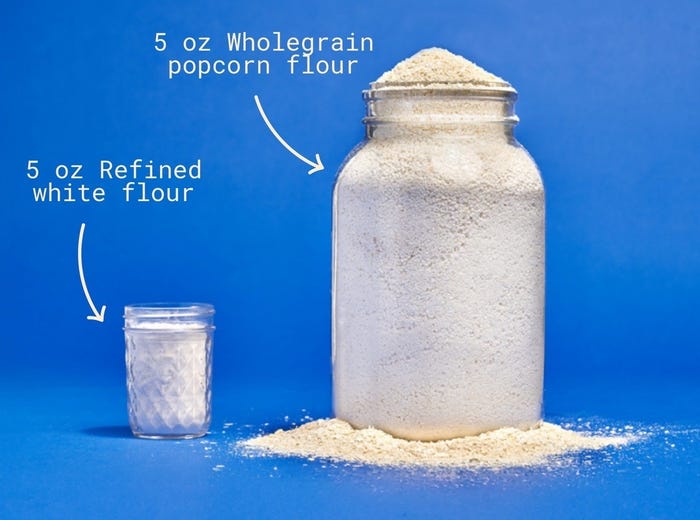
Photo courtesy of Long Table
With 5 grams of protein and fiber per one half-cup serving, the whole-grain flour is produced using heirloom grains from organic and regenerative farmers with a farm-to-table approach — where the company’s name was derived from — and has an insanely fluffy texture and neutral taste profile. If you didn’t see the label, you would never guess it’s an alternative flour.
Brown rice flour
Another whole-grain flour offering a gluten-free alternative to traditional flour is brown rice flour. Dozens of brands have created this product as a better-for-you substitute, as well as an allergen-friendly option, including plant-based food company 2foods USA. The Tokyo-based business, which recently expanded into the United States, creates Gâteau Chocolate using a mixture of Ghirardelli chocolate and Japanese brown rice flour.
“Brown rice flour is ground into ultra-fine granules at low temperatures using special technology,” Yoshikazu Azuma, founder and CEO of 2foods, said. “Brown rice is rich in vitamin B6 and minerals and is a low-sugar material. The low-temperature pulverization technology makes it ultra-fine and contains more nutrients than ordinary brown rice flour.”
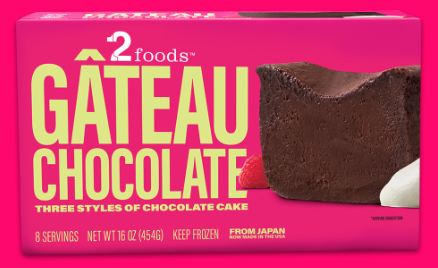
Photo courtesy of 2foods USA
The fudge-like cake, which can also be enjoyed as a mousse if thawed at room temperature and used as a melted chocolate topping when microwaved, embodies a rich chocolate flavor while served cold and a light, fluffy texture when served as a mousse.
Bob’s Red Mill, an American company that produces whole-grain foods, offers brown rice flour, along with a wide range of other gluten-free and plant-based flours. “Our founders, Bob Moore and his wife, Charlee, were passionate about whole-grain flours — the original ‘alternative flours’ — from day one, and it was Bob’s interest in traditional stone milling that inspired them to open Bob’s Red Mill in 1978,” Porter Long, R&D manager at Bob’s Red Mill, said. “It was a natural evolution that drew us to a wide range of gluten-free and grain-free flours to meet the needs of all types of consumers.”
Legume flour
As part of its plant-based, gluten-free offerings, Bob’s Red Mill developed a few legume flours to add to its lineup, including the extremely versatile chickpea flour. “Chickpea flour has a mellow, rich flavor and can be used for both savory and sweet recipes,” Long explained. “It’s also a good source of fiber and iron.”
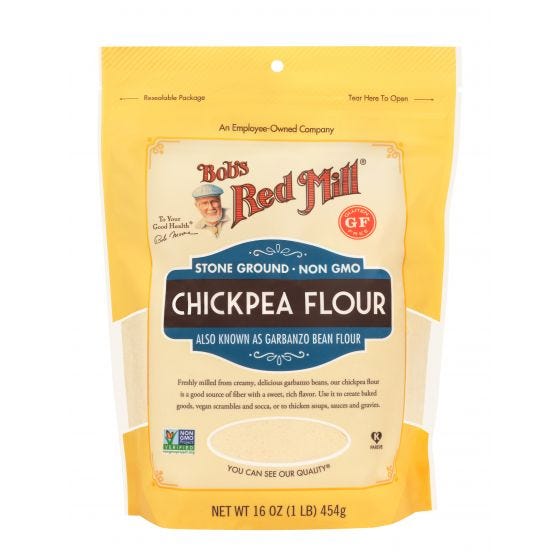
Photo courtesy of Bob's Red Mill
Unlike many gluten-free flours, chickpea flour also has exceptional binding properties. Compared to traditional flour, it’s lower in carbs and calories, with more protein, and can be used as a one-for-one replacement for traditional flour by substituting half the amount in a recipe (with the exception of cake and bread formulations, since it retains a lot of moisture).
Montana Pure Protein, a food company that produces pulse protein and starch ingredients, focuses on Montana lentils (Lens culinaris) and chickpeas (Cicer arietinum). Its two flagship flour products — High-Performance Lentil Flour and Protein Max Flour — are formulated solely using green lentils.
As company founder and CEO Christian Orms explained, Montana is the No. 1 producer of lentils in the U.S., according to the United States Department of Agriculture (USDA). The state also remains the top producer of pulse crops, including chickpeas, per USDA’s Crop Production 2022 Summary.
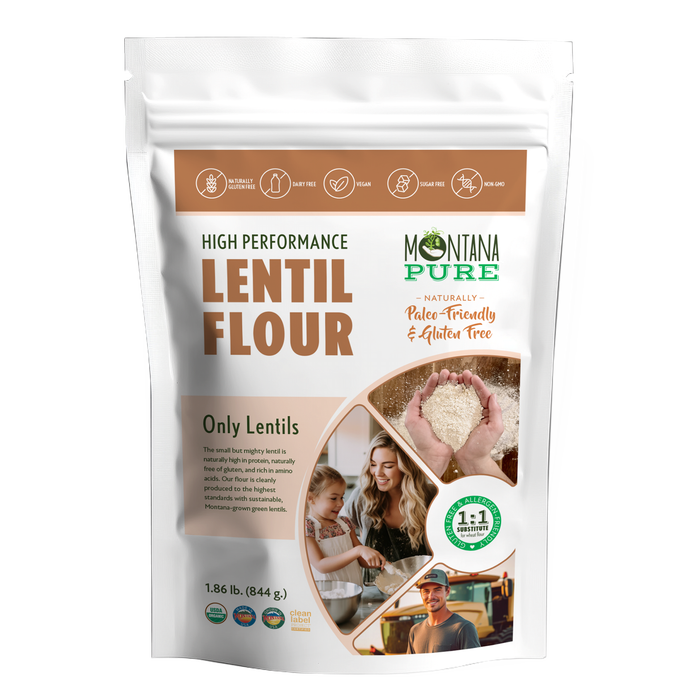
Photo courtesy of Montana Pure Protein
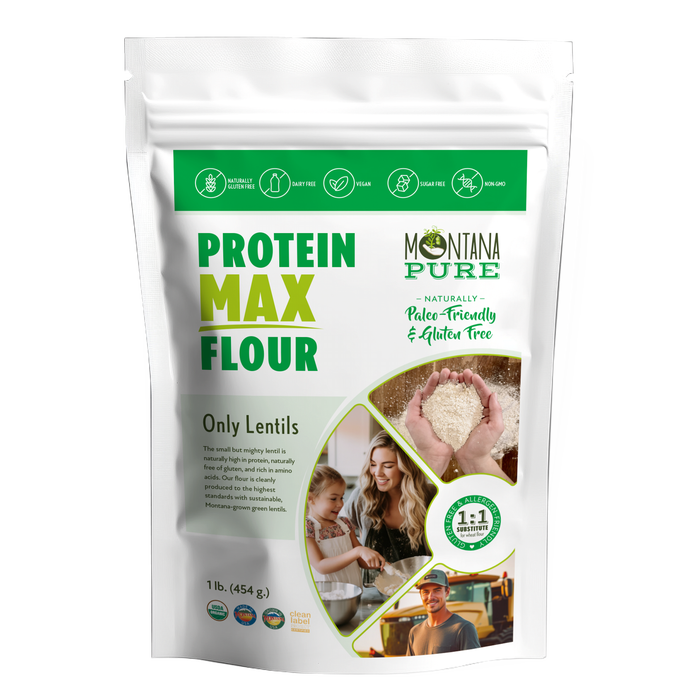
Photo courtesy of Montana Pure Protein
“I was aware of the rising demand for high-protein ingredients and the desire to pursue efficiency in production and the ability of pulse crops,” Orms said, which prompted the founding of the company in 2020. “Lentils are recognized for their nutritional value, offering benefits such as being low in sodium and saturated fat, while high in potassium, fiber, folate and antioxidants. They contain resistant starch and serve as prebiotics, supporting gut health and potentially aiding in managing diabetes, hypertension and cholesterol. Lentils are versatile in cooking, suitable for a variety of dishes, and can be stored dried for a year or cooked for a week in the fridge.”
Montana Pure Protein’s two lentil-based flours do have limitations, according to Orms, but can generally be substituted as one-for-one replacements in many applications. “We’ve worked closely with Montana State University’s Food Product Development Lab to identify applications, as well as our own work,” he explained. “A simple example is the chocolate chip cookie recipe on the bag of [Nestlé] Toll House Chocolate Chips. It’s simply out with the wheat [flour], in with the lentil [flour] and voila!”
Lentils provide a very light flavor profile, per Orms, which is why they’re a great alternative to traditional flour. “In many instances where the flavor is detectable, it has a slight nutty flavor and can complement or even enhance the flavor,” he said. “With respect to texture, it can present differently on an application-to-application basis by product. The chocolate chip cookie recipe is a perfect way for consumers to get familiar with the presentation. In this recipe, the Protein Max Flour presents more moist, chewy and pliable. With the High-Performance Flour, it’s more like a wheat flour: drier and more brittle.”
Avena Foods, a specialty miller that provides functional gluten-free pulse ingredients, offers ready-to-eat (RTE) pulse flours and egg replacers. The RTE pulse flours and egg replacers are made from sustainably grown yellow lentils, chickpeas and navy beans, and can be used to make pancakes, waffles, muffins, cookies, donuts and other types of baked goods, as well as sauces and dressings (hollandaise and gravy), puddings and fillings.
“There is a huge need in the market for gluten-free flours and alternatives to eggs,” Margaret Hughes, VP of sales and marketing at Avena Foods, said. “Avena’s pulse egg replacers are gluten-free, plant-based, whole ingredients that are cost effective with price stability and reliable supply.”
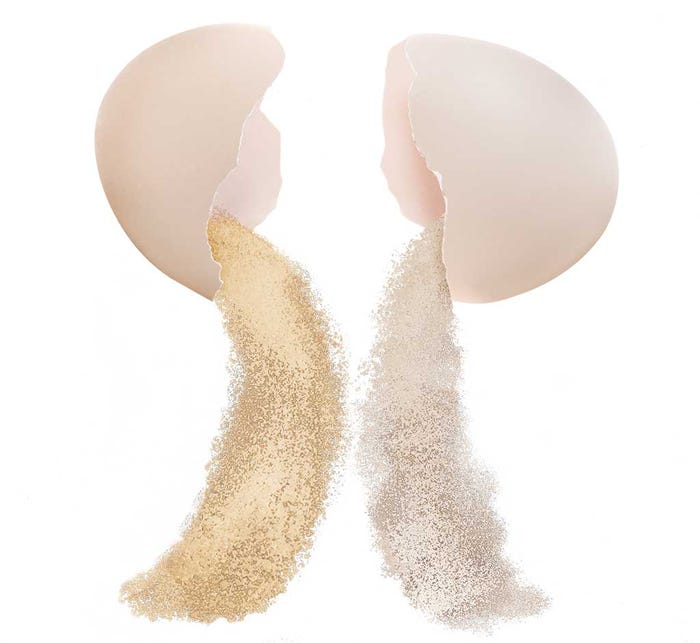
Photo courtesy of Avena Foods
Created using whole navy beans, the company’s RTE ingredient Avena Pulse Visco Enhancer NB (PVE NB) offers emulsifying, binding structure building properties of eggs. The other two RTE ingredients, Avena Pulse Visco Enhancer CP (PVE CP) and Avena Best Pulse Visco Enhancer DYL (PVE DYL), mimic the gelling properties of egg whites and provide the golden color in baked goods, respectively.
TruEats Modern Baking Company, which specializes in plant-based baking mixes and sweeteners, was created by father-and-son duo Surinder Kumar and Daven Kumar. Surinder, a food scientist with more than 40 years of experience leading R&D and innovation for some of the world’s leading CPG and pharmaceutical companies, developed all of the company’s formulations and products, with health at top of mind.
TruEats’ baking mixes — Cupcake & Cake, Muffin & Cake, Pancake & Waffle, Brownie — are made using a blend of chickpea flour, almond flour, buckwheat flour, moong dal flour and urad dal flour. They also incorporate the company’s Premium Monk Fruit Sweetener and erythritol, in place of traditional sugar.
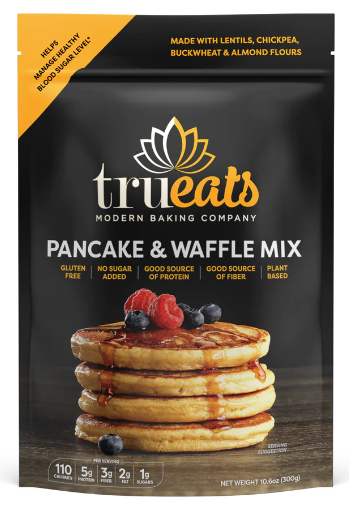
Photo courtesy of TruEats Modern Baking Company
“Our products are specially formulated to provide the best possible nutrition for those with selective diets, particularly those with diabetes and food allergies,” Daven Kumar, co-founder and CEO of TruEats, said.
The flour blend — comprised of legumes (chickpeas, moong dal [mung beans/yellow lentils] and urad dal [black lentils]), seeds (buckwheat [Fagopyrum esculentum]) and nuts (almonds) — provides a good source of protein and fiber. The mixes all contain 5 grams of protein, 3 grams to 5 grams of fiber and 1 gram of sugar per 40-gram serving.
Two of the standout ingredients, moong dal (Vigna radiata) and urad dal (Vigna mungo), are native to South Asia and popular in Indian cooking. “Moong dal is a good source of protein and fiber, low in fat, gluten-free and low glycemic, and rich in vitamins and complex carbohydrates,” Kumar explained. “Urad dal is a good source of protein and fiber, low in fat, gluten-free and low glycemic, and rich in complex carbohydrates.”
With a mission to provide great-tasting, scientifically credible, nutritional food products to consumers — specifically with diabetes and other dietary restrictions — the company recently conducted an independent clinical study on the Muffin & Cake Mix with the help of The Ohio State University food science department, which included blood glucose monitoring. “The study showed that our product’s taste/texture/overall consumer liking was at parity with Duncan Hines,” Kumar said. “However, blood sugar of participants spiked with the Duncan Hines product, while glucose levels using the TruEats’ product had no spikes with an acceptable rise and actually showed sustained energy over multiple hours proving the nutritional credentials and benefits, particularly for those with diabetes and pre-diabetes.”
Nut flour
Within the realm of plant-based flours is nut flours, which are equally as popular. They’re also naturally gluten-free, as they don’t contain any grains, so there’s an extra level of appeal. And since nuts are technically fruits, what fun it is to be able to write the words, “fruit-based flour.”
Karma Nuts, which produces oil-free cashew nuts, recently unveiled a line of cashew cookies with cashew flour that’s created using the company’s air-roasted cashews. The bite-sized cookies, sweetened with dates and coconut sugar, contain a handful of ingredients and no refined sugars.
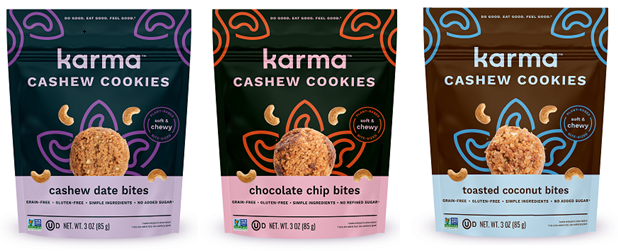
Photo courtesy of Karma Nuts
The company saw a need for better-for-you alternatives to conventional cookies, which are typically packed full of sugar and artificial ingredients, and diet-specific options that normally aren’t very tasty. The cashew flour also contributes additional health benefits compared to traditional flour, as it incorporates protein, fiber and minerals, and has anti-inflammatory and prebiotic effects from the cashews, according to the National Library of Medicine.
“People eat cookies because they want a little treat, so they should be delicious,” Ganesh Nair, founder and CEO of Karma Nuts, said. “Through the power of cashew flour, the Karma Nuts team has crafted amazingly soft and chewy, plant-based treats that use simple ingredients.”
And delicious they are.
About the Author
You May Also Like

